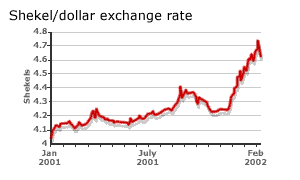
|
|
|
||
|
Israeli economy mired in crisis
Israel is in the throes of one of its worst recessions since the state was founded in 1948. Unemployment last month rose to over 10% of the workforce, its highest level ever, and a jump of almost one-fifth since the beginning of 2001. The jobless figure is the latest in a stream of gloomy news for the Israeli economy, which has been hit by the triple blow of the current troubles, the woes of its crucial hi-tech companies, and the sharp slowdown in the United States, a key trading partner. Investors are now pinning their hopes on further cuts in interest rates as the only way to kickstart once-buoyant growth. Jobless blackspots The unemployment figures have come as a particularly bitter blow in a country which has traditionally enjoyed extremely low jobless rates. The worst figures are seen in Arab areas: in the town of Kfar Manda, in the Galilee, joblessness stood at 22%. Indeed, the 21 towns with the highest unemployment are all predominantly Arab, and the worst-hit Jewish town, Ashkelon, has just 10% unemployment. In the Palestinian territory, unemployment recently hit a high of 26%. Shocks pile up The joblessness news comes as the latest in a string of economic shocks for Israel.
In 2001, its economy shrank by 0.5%, with the contraction accelerating towards the end of the year; during the last three months, gross domestic product was down 7.2% year on year. The year before, by contrast, saw growth of 6.4%. According to a report produced by the Bank of Israel last month, the current spate of violence between Israelis and Palestinians has cost the economy 13bn shekels (£2bn; $2.8bn) in lost output, mainly thanks to a sharp drop in tourism revenues. And while the economy has sagged, government expenditure has increasingly been diverted to the military, spurring an increasingly alarming budget deficit. Cashflow dries up The Palestinian uprising is not the only cause of the slowdown. Israel has been hit hard since 11 September, partly because of investor nerves over the Middle East in general, and partly because the slowdown in the US has cut flows of money from one of its biggest trading partners. The reduced inflows of cash have helped batter the shekel, which has now lost 10% of its value against the dollar since the World Trade Center attacks. And Israel has long boasted an extensive list of technology firms, many of which are listed on the New York Nasdaq stock market. Since the collapse in hi-tech investment two years ago, funding for this once-proud sector has shrivelled to a trickle. Signs of hope? Investors are now looking for salvation from the Bank of Israel, which is due to make another decision on interest rates at the end of this month. The Bank has slashed rates from 8% at the beginning of last year to the present 3.8%, and until recently had been thought likely to start raising them. But this week's gloomy figures have raised hopes for steady rates, or even a further cut. Progressively lower rates have helped give the economy a short-term boost, by encouraging Israelis to put their money into the markets, rather than saving it. As a result, the decline in the Tel Aviv Stock Exchange - down around 15% in local currency terms since the beginning of last year - has been far less dramatic than the plunges suffered in most other emerging markets. And in one further sign of mild hope, new figures have shown that
demand for communications and computer workers rose in January by
9.4% month on month, the first rise since October 2000.
|
||

